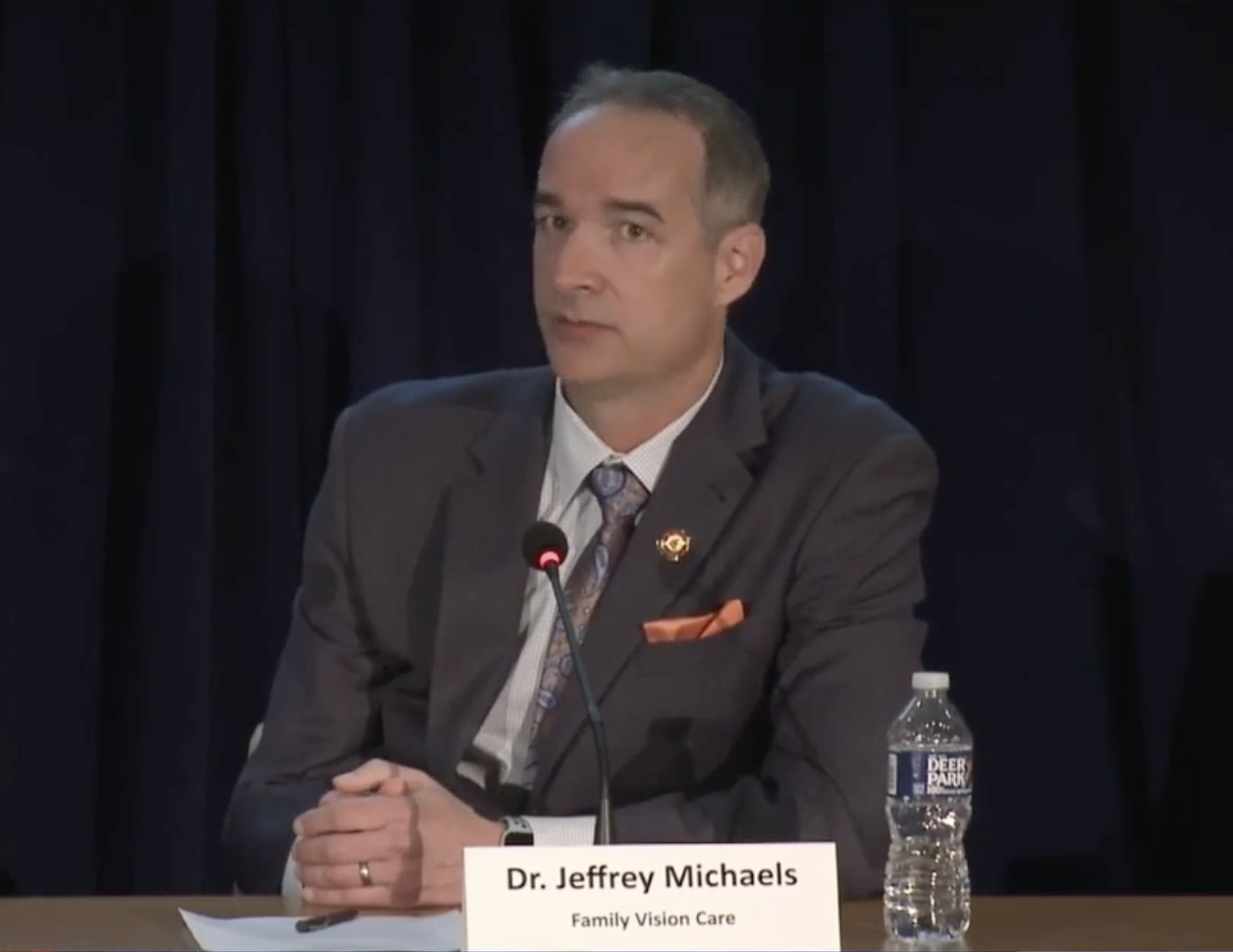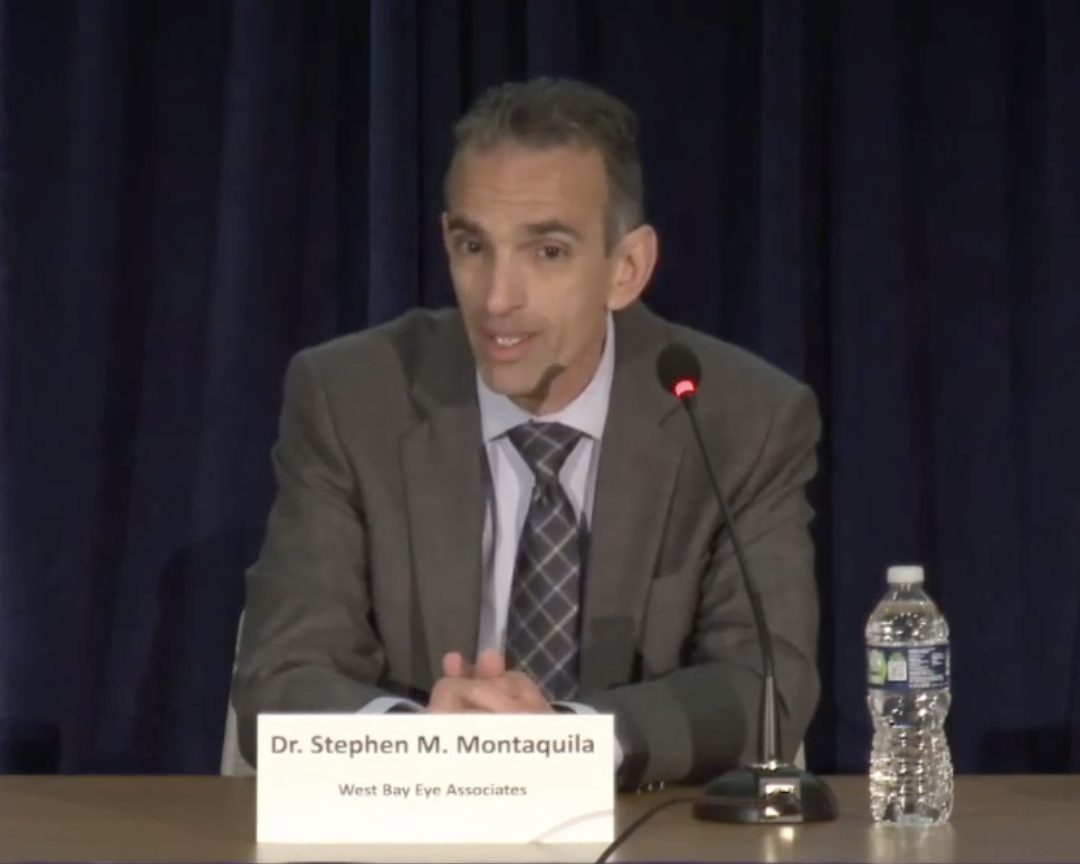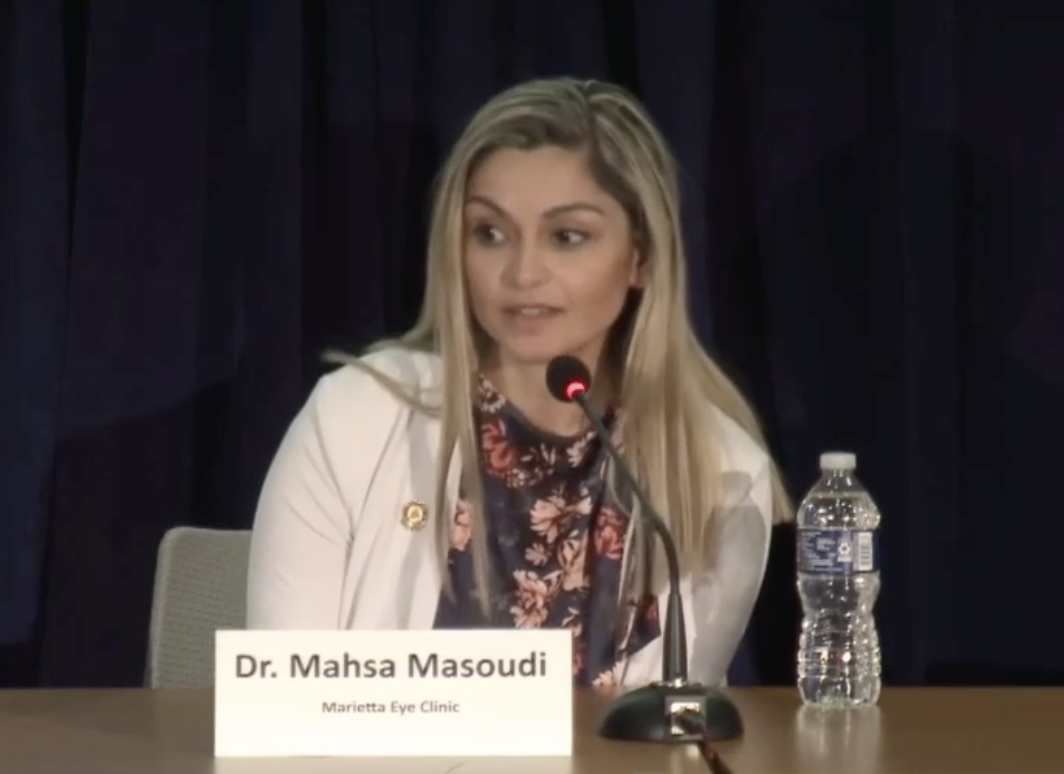 |
| During the FTC workshop's panel discussion, Jeffrey Michaels, OD, co-owner of Family Vision Care of Richmond and chair of AOA Federal & Regulatory Policy Communications, pressed the point that ODs and MDs have already been properly releasing prescriptions for years. Click image to enlarge. |
On May 18, the Federal Trade Commission (FTC) held a public workshop to discuss the proposed changes to its Eyeglass Rule that were introduced back in December 2022. The hotly contested changes are intended to enforce the current requirement that ODs and ophthalmologists provide all patients with a copy of their prescription following an eye examination and promote competition in the eyeglass market. The FTC plans to use the feedback from the workshop—attended by several members of the American Optometric Association (AOA) and doctors from various states, as well as a virtual audience—to evaluate whether to pursue its recommendations.
Prospective Rule Changes
The FTC has suggested the following notable changes to the Eyeglass Rule:
- Require ODs and MDs to obtain a signed statement from the patient—which must be kept on file for three years—confirming that they received their prescription
- Distribute prescriptions as digital instead of paper documents only with a patient’s written or recorded consent
- Allow a patient’s proof of insurance coverage to constitute a payment
- Change the term “eye examination” to “refractive eye examination” throughout the rule
The changes mirror those of the Contact Lens Rule, which were adopted in 2020 to mandate contact lens prescribers to have patients sign an acknowledgment that they received a copy of their contact lens prescription after fittings.
The AOA sent a letter to the FTC back in March to voice its perspective on how the changes could adversely affect optometry practices, the majority of which are small businesses. The association also questioned the necessity of the proposed measures in the letter, pointing out that fewer than 50 out of 55,000 prescribers in the US have been warned about noncompliance with the current prescription release requirement. The AOA enumerated all these points and more during the FTC workshop last week, titled “A Clear Look at the Eyeglass Rule.”
Highlights from the Panel
To kick off the hearing, Sam Levine, director of the FTC’s Bureau of Consumer Protection, gave a statement on the intentions of the proposed changes and the workshop itself. “As many of you probably know, the Eyeglass Rule has been in place since 1978, and since that time, the goal of the FTC in this space has been to promote competition in the eyeglass marketplace and to empower consumers to comparison shop for glasses by making sure they have a copy of their prescription in hand after their eye exam,” explained Mr. Levine, as quoted in a recent Vision Monday article. “We're holding this workshop because we have been taking a close look at the Eyeglass Rule and how it's working in practice, and we've proposed a few updates to the rule with the goal of improving compliance and increasing clarity around its requirements.”
The workshop pivoted to a panel discussion, where several optometrists and AOA members spoke up about their concerns regarding the impact of the proposed changes on clinical practice.
“I think that the automatic compliance with this is so ingrained in optometrists and ophthalmologists that it's just a normal part of the day,” remarked Jeffrey Michaels, OD, co-owner of Family Vision Care of Richmond and chair of AOA Federal & Regulatory Policy Communications. “Clearly, we can find 30 people across the country who may not have complied,” he said, adding that some of the (very few) reported cases of noncompliance can also be chalked up to patient misunderstandings.
Dr. Michaels and other AOA members who attended the workshop further explained that most patients being seen today (88%) have electronic health records allowing them to immediately access their prescriptions after an exam.
 |
| Stephan Montaquila, OD, president of the West Bay Eye Associations in Warwick, RI, and member of the AOA Federal Relations Committee, presented several points to the FTC about the potentially deleterious effects that the proposed Eyeglass Rule changes could have on OD and MD practices. Click image to enlarge. |
Another panelist, Stephan Montaquila, OD, president of the West Bay Eye Associations in Warwick, RI, member of the AOA Federal Relations Committee and immediate past chair of the AOA Third Party Center Executive Committee, said that one aspect of the proposed changes he finds most concerning to the optometry community is that “the FTC has decided that it's not enough for a patient to be given the prescription electronically or in their portal." Rather, Dr. Montaquila remarks that “the FTC went a step further and said that doctors have to receive verifiable affirmative consent to provide the prescription electronically.”
In other words, the proposed changes to the Eyeglass Rule would require prescribers to obtain a signed statement from the patient or, alternatively, record them giving consent before an electronic prescription can be distributed in place of a physical copy. “I'll just be frank,” Dr. Montaquila commented during the workshop, “the idea of pulling out a recorder and asking a patient to consent on tape is really incredibly demeaning to the physician or their staff.”
He added that this stipulation also creates additional paperwork for clinics, many of which are facing staffing shortages. Language barriers are another challenge to consider, explained panelist Mahsa Masoudi, OD, who practices at the Marietta Eye Clinic in Atlanta and is a member of the AOA Education Center Committee. “If English isn’t that patient’s first language, and they don’t have an interpreter, this [additional paperwork] might be particularly trying for some patients and staff,” a recent AOA article paraphrased from Dr. Masoudi’s statement.
 |
| The additional paperwork the proposed changes would impose on practices may especially affect those that see a lot of patients who don't speak English as their first language, says Mahsa Masoudi, OD, who practices at the Marietta Eye Clinic in Atlanta and is a member of the AOA Education Center Committee. Click image to enlarge. |
“Compliance is costly to the patient and the doctor,” summarized Dr. Montaquila. “While the FTC has offered options for compliance, all of them have challenges.”
Dr. Montaquila also refuted a statement in the FTC’s proposal during the panel discussion: “In the rulemaking, there were actually accusations that doctors would try to make their patient portals challenging to access so that patients would not be able to obtain their prescriptions,” he said. The Commission made these accusations despite not referencing any evidence to prove that this is actually the case anywhere in the US, he clarified.
Before the meeting wrapped up, Mr. Levine told panelists that the FTC will “examine what effects the proposed rule changes might have in terms of promoting competition and increasing consumer choice, and whether there are burdens these changes might impose on prescribers.”
Now, it’s your turn to voice your thoughts and concerns to the FTC. The Commission will be accepting public comments on the proposed Eyeglass Rule changes until June 20, 2023. Submission details and more information can be found at regulations.gov.


